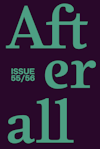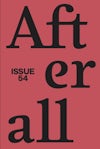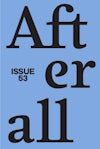
Issue 18
Summer 2008
Editors: Charle Esche, Thomas Lawson, Mark Lewis, Dieter Roelstraete, Pablo Lafuente, Melissa Gronlund, Stacey Allan.
Founding editors: Charles Esche, Mark Lewis.
Table of contents
Foreword
Contextual Essays
- Some Afterthoughts on the Migration of Form – Roger M. Buergel & Ruth Noack
- How to Become Dutch – Dieter Lesage
Artists
William Pope L
- Hole-ly Moly: The Work of William Pope.L – Nato Thompson
- Pain Should Not Be Ignored: On Facing One’s Bogeyman – Rodney McMillian
Javier Téllez
- El sueno de la razon produce monstruos: On the Work of Javier Téllez – Michèle Faguet
- Acting Naturally: The Face and the Mask
Cameron Jamie
- Suburban Attractions – Edwin Carels
- The Other Who Is Oneself: Cameron Jamie – Elizabeth Janus
Sturtevant
- Sturtevant: On Art and Its Time – Belinda Bowring
- Sturtevant in Conversation with Bruce Hainley – Bruce Hainley
Events, Works, Exhibitons
- One Script for 9 Scripts from a Nation at War – Ian White
- Mandarin Ducks: A Film in 10 Scenes – Pablo Lafuente
- Behind the Velvet Curtain. Remembering Dušan Makavejev’s W.R.: Mysteries of the Organism – Boris Buden
Foreword
Written by Stacey Allan
Artists, like madmen, have also been historically charged with the gift of vision and the ability to reveal potentially transformative truths…
The product of an editorial process involving multiple personalities, free association and sometimes disorganized thought, Afterall 18 is, perhaps symptomatically, threaded with an element of madness.
The historical evolution and structuring of ‘madness’ as a Western cultural concept was charted famously by Michel Foucault in his first book, Madness and Civilization (1961), in which he proposed that the decline of leprosy in the Middle Ages cast the insane in the role of pariah, finding them expelled from their villages and literally set adrift at sea on the proverbial ‘ship of fools’. Though the existence of these ships and the validity of Foucault’s claim remain in question, there is little doubt that the experience of madness was gradually differentiated and socially unmoored. Foucault speculates that the mad among men were once thought to be closer to God, gifted with sight and capable of pointing out great truths. In Renaissance literature, for example, this was reflected in the archetype of the fool or jester, whose wisdom was disguised by his lack of power. Harmless and entertaining, the fool was free to speak critically because of his position outside the social order. Particularly in Shakespeare, he was often revealed as the voice of reason within a kingdom of chaos.
Sandwiched historically between ‘folly’ and ‘illness’, ‘madness’ is a classification that reflects a change in the social psyche and the introduction of fear of it sometime around the seventeenth century. As a construct set in dark opposition to Enlightened reason, it conjures imagined scenes of chaos and bedlam that put civilised society at risk. During this period, which Foucault termed the ‘Great Confinement’, asylums were built to isolate ‘unreasonable’ members of the population, with no real distinction made between criminals, beggars and the insane until the development of psychiatry and the conceptualization of mental illness in the nineteenth century. If Western culture once believed the mad to be gifted with sight and free to speak truths that would be otherwise unspeakable, Foucault argued that they have since been treated with an isolating and unbreachable silence; ‘The language of psychiatry,’ he writes, ‘which is a monologue of reason about madness, has been established only on the basis of such
a silence.’
Purchase
The publication is available for purchase. If you would like specific articles only, it is also available individually and to be downloaded as PDFs.
Purchase full publication
Buy via University of Chicago Press
Buy via Central Books
Purchase individual articles
Buy via University of Chicago Press



